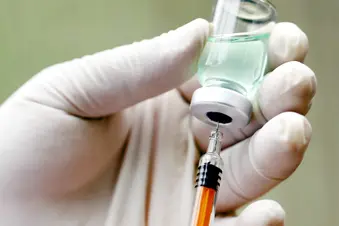
Cells all over your body depend on vitamin B12. But you don’t make this nutrient on your own. And you sometimes may not get enough of it. What you do or don’t eat, along with certain surgeries or other health problems, may be the reason.
Treatment for a B12 deficiency is pretty simple. But it’s important to get help early. If you run low for a long time, it can lead to serious health issues. That includes memory problems or nerve damage that may not go away.
If you’re low in B12 or think you are, talk to your doctor. Here are some ways they can help.
Find the Cause
Your treatment plan depends on why you lack B12. The doctor will ask you about what you eat and if you have other health conditions. Be sure to tell them about any medications or supplements you’re taking.
Causes of B12 deficiency include:
Aging. Older adults tend to have less of the stomach acid you need to absorb B12 from food.
Pernicious anemia. This is an immune system disorder that affects cells in your stomach. If you have it, you don’t make enough of a protein called intrinsic factor. You need this to absorb B12 from food.
Digestive disorders. That includes conditions like Crohn’s disease, ulcerative colitis, or celiac disease.
Liver problems. You need a healthy liver to store B12.
Diet. Vegans or vegetarians are more likely to have a B12 deficiency. Most plant-based foods don’t have much or any of this nutrient. If you’re pregnant or breastfeeding, a diet low in B12 could affect your baby.
Surgery. Any procedure that takes out part or all of your stomach will likely lower the number of cells that help you absorb B12.
Medication. Certain drugs, including metformin and antacids, can lessen your body’s ability to take in B12.
Alcohol misuse. You may not eat enough B12-rich foods if you drink a lot. It might also stop your stomach from absorbing enough nutrients.
Ways to Manage Your B12 Deficiency
Your liver stores this nutrient for a long time. It can take 3-5 years to use it up. Most adults only need 2.4 micrograms a day. You’ll need a little more if you’re pregnant or breastfeeding.
Your doctor may recommend:
Shots. They can put B12 directly into your muscle with a needle. This bypasses your stomach. That means it’ll get into your body even if you have absorption problems.
You may get a shot once a week for a month. But you might need them more often if you have more serious symptoms, like nerve problems, or your pernicious anemia is serious. You may need to get a shot once a month for the rest of your life.
Nasal spray. If you don’t like needles, ask your doctor about a prescription nasal spray. You’ll spray 500 micrograms up one nostril every week until your levels are normal.
Dietary supplements. You can swallow a pill or take a tablet that melts under your tongue. The doctor may start you out at 1,000-2,000 micrograms a day. Once your levels are normal, you may need 100-500 micrograms a day or 1,000 micrograms one or two times a week. Your doctor can let you know which dose is right for you.
Certain groups may need to take a B12 supplement for life. These include:
- Vegans or strict vegetarians
- People who’ve had surgery for weight loss or stomach cancer
- People with pernicious anemia
- People older than 50
Food. Large amounts of B12 come from animal products, like red meat and fish. It’s also found in poultry, eggs, dairy, and some plant-based or fortified foods. Don’t worry if you don’t know how to change your diet. Your doctor can refer you to a dietitian. They’re specialists trained to help you come up with a food plan you can stick to.
Some B12 sources include:
- Clams
- Liver and beef
- Trout and salmon
- Canned tuna
- Low-fat milk
- Low-fat yogurt
- Whole egg
Plant-based B12 sources include:
- Fortified cereals
- Fortified nondairy milks
- Nutritional yeast
- Nori seaweed
- Tempeh
Are There Side Effects?
Vitamin B12 is generally considered safe. You usually pee out what you don’t need. But you shouldn’t take lots of it unless your doctor tells you to. Higher doses can cause unwanted side effects.
High doses of B12 may cause:
- Dizziness
- Headache
- Anxiety
- Nausea
- Vomiting
What to Expect After Treatment
If you have anemia, it’ll likely get better in 6-8 weeks. It may take a little longer for your nerve problems to improve. Serious nerve damage that lasts a year or longer may not go away. Older adults who have dementia usually don’t think or remember better after treatment.
Your doctor will probably check your blood every now and then to make sure your B12 levels are normal. If you have pernicious anemia or another condition that doesn’t go away, you may need shots or supplements forever. Your doctor will help you find the right plan to stay healthy.
Show Sources
SOURCES:
American Family Physician: “Vitamin B12 Deficiency: Recognition and Management.”
Office of Dietary Supplements (NIH): “Vitamin B12.”
Merck Manual: “Vitamin B12 Deficiency (Pernicious Anemia).”
Clinical Medicine (Royal College of Physicians): “Vitamin B12 deficiency — A 21st century perspective.”
National Heart, Lung, and Blood Institute: “Pernicious Anemia.”
World Journal of Gastroenterology: “Nutrition in alcohol-related liver disease: Physiopathology and management.”
European Journal of Clinical Nutrition: “Effects of moderate alcohol consumption on folate and vitamin B12 status in postmenopausal women.”
Mayo Clinic: “Vitamin B-12.”
Ankar, A., Kumar, A. Vitamin B12 Deficiency, StatPearls, 2020.
DailyMed: “Nascoba — cyanocobalamin spray.”
Nutrients “Vitamin B12 among Vegetarians: Status, Assessment and Supplementation,” “Vitamin B12-Containing Plant Food Sources for Vegetarians.”
Johns Hopkins Medicine: “What to Know About Cancer Surgery.”